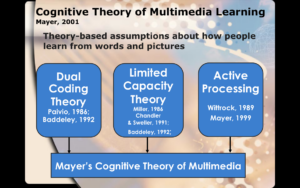Hey everyone! My name is Claire, and I’m in my third year at UVic. I’m pursuing a major in French and a minor in Education in hopes of becoming an elementary school teacher. My family is originally from Taiwan, but my parents immigrated to Canada in 1995 to raise my brother and I; we were both born in Musqueam land (Richmond, B.C.). During my pastime, I enjoy spending time with my friends, watching movies, playing volleyball, going to the beach, and enjoying different types of cuisine.
This week’s “How do We Learn” content is quite mesmerizing. I was taken away by Mayer’s Cognitive Theory of Multimedia Learning (CTML) and the three cognitive science principles. These three cognitive principles significantly affect how our brain functions, react and assess plausible situations. The Dual Coding Theory is a beautiful concept regarding how our brain distinguishes information. I had no idea our memory has codes that deal with visual and verbal stimuli, and although they are independent factors, they are still linked. This promotes the enrichment of the information and content a learner is absorbing. It’s beyond fascinating that our brain is capable of such wonders. According to Mayer, active processing occurs when we create logical representations in our minds through an active process of filtering, selecting, organizing and integrating information (Loveless, 2022). This principle is essential in our everyday lives, especially as students; it’s an everyday occurrence where this would be applied. Personally, active processing consumes my mind and actions. This idea of delegating and organizing my life can be overwhelming, but that’s where the principle of limited capacity comes in. Ultimately, these three principles go hand in hand with one another, which I had not known about until now.
Here’s a picture example of the three cognitive principles:

Reading the four principles from Mayer’s theory of reducing extraneous cognitive load opened my eyes to what I could do better in my future work and presentations. They are straightforward principles that should be deemed obvious. Still, after going through them, I realized how simple it is to make mistakes in my work, such as adding interesting but off-topic materials or repeating information in my learning projects. These are wonderful principles to know and stick by; they are great reminders to elevate my learning projects!
References:
Loveless, B (2022, March 17). Dual Coding Theory: The Complete Guide for Teachers. Education Corner. https://www.educationcorner.com/dual-coding-theory/
Mayer’s Cognitive Theory of Multimedia Learning [Digital Image]. https://www.blendspace.com/lessons/cDlX50QivCWYRA/mayer-s-cognitive-theory-of-multimedia-learning